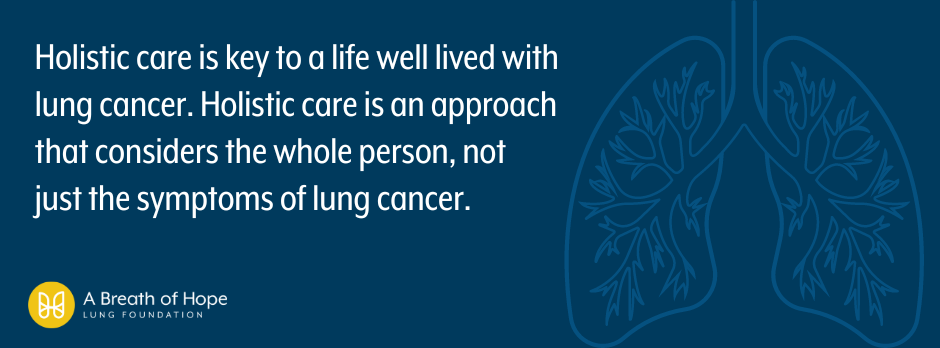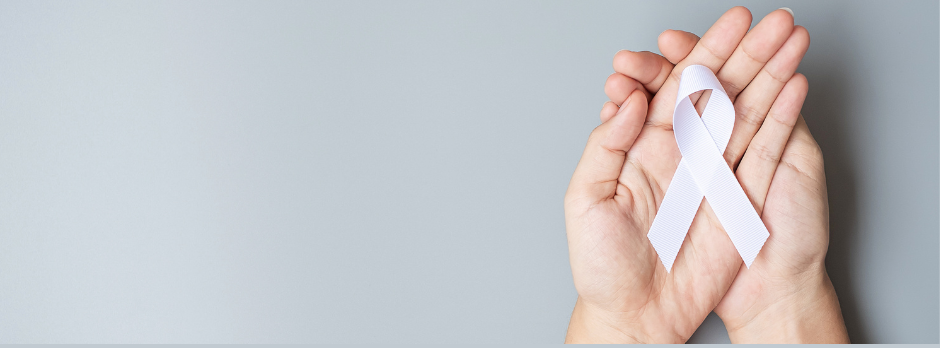Carrie Salsness, Director of Patient Support & Outreach Programs
A lung cancer diagnosis is life-changing. You will have many new things to think about as your life changes in a way you could not have expected. For many, the focus on treatments and well-being allows physical, mental, and emotional well-being to take a back seat. It may feel that much of your care is out of your control; however, focusing on the parts of your life you can manage will help you feel more self-assured and in control. It may even improve your health outcomes.
Cancer survivorship may be a new term to you, especially if you are receiving treatment. Survivorship is often mistakenly thought of as the end of the cancer journey, the finish line. However, you are considered a cancer survivor from the time of diagnosis through the rest of your life. Whether you are newly diagnosed, actively receiving treatment, or finished with cancer treatments, you are in charge of your cancer journey. You are a survivor, a thriver, a warrior; no one knows your unique needs like you do. Taking ownership of your cancer journey allows you to live life on your own terms.
Cancer survivorship includes a focus on mind, body, and spirit. It’s important to find the right balance for yourself, as everyone’s journey is unique. A Breath of Hope Lung Foundation recognizes that holistic care is key to a life well lived with lung cancer. Holistic care is an approach that considers the whole person, not just the symptoms of lung cancer. Studies show holistic care can improve patient outcomes and well-being by healing the mind, body, and soul.

Holistic care can feel overwhelming. We have all heard we should reduce stress, eat right, and get more exercise. As a cancer survivor, these messages are all the more important, but what do they mean? How does a cancer diagnosis impact what you were already doing, and how can you figure out what works for you?
A Breath of Hope’s Patient and Family Support Program aims to fill support gaps during the lung cancer journey by offering patient education and direct services such as support groups and transportation. As lung cancer outcomes improve in our nation and patients live longer than ever before, a focus on survivorship is the logical next step for our Patient and Family Support Program.
As 2024 rolls out, A Breath of Hope will focus on adding three areas of Survivorship programming: Mindfulness, Physical Activity, and Nutrition.
Mindfulness – Overcoming stress to find peace in the present
It’s common for individuals living with lung cancer to experience increased stress, anxiety, and depression. Anxiety is an emotion characterized by feelings of tension, worried thoughts, and physical changes like increased blood pressure. Emotional health can affect your daily life, and many people need added support during this time. Having tools to address these feelings leads to a better quality of life during your cancer journey.
Mindfulness can be defined as a state of active, open attention to the present. This state is described as observing one’s thoughts and feelings without judging them as good or bad. A mindfulness practice can take place at any point in your day, impromptu when needed the most or at a planned time. It is a tool that can help you find focus, peace, and inspiration during challenging times. Many individuals notice a decrease in stress levels and an increase in resilience when practicing mindfulness.
Physical Activity – Movement that improves health
A report from the 2018 American College of Sports Medicine International Multidisciplinary Roundtable on Physical Activity and Cancer Prevention and Control found that every cancer survivor should maintain some level of physical activity, in addition to strong evidence that exercise during and after cancer treatment can reduce anxiety, depressive symptoms, and fatigue, and improve health-related quality of life and physical function. For many, incorporating movement into a daily routine can improve quality of life.
Lung cancer symptoms may have affected your physical activity prior to diagnosis, and many people don’t know where to start after diagnosis. Others may not have had a routine prior to their diagnosis and are unsure how to start one. Concerns about safety, lack of energy, and loss of mobility can deter many from increasing physical activity. Starting slow, following the advice of your care team, and learning proper form are all important when starting or resuming a physical activity routine.
Nutrition – Foods for prevention and healing
Nutrition plays a key role in cancer survivorship. What we feed our bodies affects how we feel, energy levels, our mood, and can reduce your risk of cancer recurrence. Making the right choices can be hard. It seems like everywhere you turn there is new ‘advice’ on what to eat. Making a few small changes can go a long way.
The American Institute for Cancer Research recommends starting here:
- Eat a diet rich in whole grains, vegetables, fruit, and beans.
- Limit consumption of fast foods and other processed foods that are high in fat, starches, and sugars.
- Limit consumption of red and processed meat.
- Limit consumption of sugar-sweetened drinks.
- Limit alcohol consumption.
- Aim to meet nutritional needs through diet, not supplements.
As A Breath of Hope starts this survivorship journey, we hope you will join us and experience the benefits focusing on mindfulness, physical activity, and nutrition brings.



